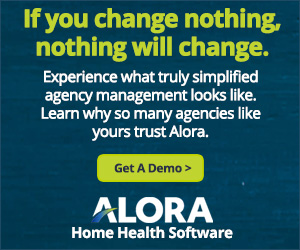
10 Jan Building Community Partnerships for Enhanced Home Health Services
Engaging community players for home health agency growth and expansion
Community partnerships emerge as a symbol of excellence when it comes to enhancing home health services. These partnerships represent a synergy between home health agencies and local organizations, creating a network that goes beyond clinical care. By recognizing the community’s role in influencing the well-being of its members, this approach highlights efforts that lead to more comprehensive and individualized home health services. Therefore, community partnerships are vital! So, where exactly do you start?
The Power of Collaboration
Community partnerships are powerful alliances that strengthen the core of home health services. They reach far beyond clinical boundaries, tapping into the community’s strengths to foster a collaborative vibe that amps up the quality and accessibility of home-based healthcare.
So, whether it’s pooling resources, combining expertise, or uniting for the greater good of community wellbeing, these partnerships act as a driving force for innovation, responsiveness, and putting the patient front and center.
Establishing Relationships with Local Organizations
Home health agencies can utilize unique engagement methods to foster connections with community groups. One practical approach is participating in local events, fairs, and gatherings. By doing so, agencies can directly interact with community members and organizations, creating opportunities for engagement and partnership. There are a few ways to do this and some actionable steps to take:
Actionable Steps for Outreach
- Engaging in Events: Start by identifying events and fairs in the local area that are relevant to the healthcare field. Allocate resources to actively participate in these events, and make sure you mark it on your calendar.
- Planning Workshops: Develop a plan for hosting workshops and seminars centered around healthcare topics. Outline the issues to be covered, reach out to speakers, and devise promotional strategies to maximize the impact of these events.
- Active Social Media Presence: Establish a social media presence that ensures the sharing of health-related content. Engage with the community by responding to comments and messages on social media platforms.
Tailor your Services
The trick to tailoring services to community needs is being proactive; you can form long-term residents’ advisory groups to make constant adjustments in service. This is an excellent opportunity to establish a system of reciprocal input so that community members can exchange experiences and make suggestions for service improvement.
Actionable Steps for Tailoring Services
- Forum Organization: Organize periodic neighborhood assemblies or town hall meetings. Explain the function and invite participation in communities.
- Advisory Group Formation: Locate community members willing to serve in an advisory group. Set up a periodic schedule for feedback and cooperation.
- Feedback Loop Implementation: Establish a systematic feedback mechanism between the community and administration and take the time to act on constructive suggestions.
Develop Personalized Care Plans
Care plans are not just about checking the boxes, what home health software you utilize, and administration of services. Cultural competency must also be considered a core principle in developing personalized care plans. One great idea is to offer language access by employing interpreters or providing materials in translation to solve the problem of different languages and take it a step further.
Actionable Steps for Personalized Care Plans
- Cultural Competency Integration: Incorporate cultural competence into the design of care plans. Make sure you offer cultural sensitivity training to staff members.
- Language Access Implementation: Employ language access-language interpreters and translated materials. It’s a great idea too, to have an ASL interpreter as well.
Putting Compliant Practices in Place Without Prior Innovation
It is essential for legal professionals specializing in healthcare to get the balance between obeying rules and coming up with new collaborative ideas. They can advise on compliance issues, such as contractual arrangements, data sharing, and any legal ramifications arising from the program’s implementation. They can also establish regular compliance audits as a systematic process to assess compliance with regulations, promptly handle problems that arise, and take corrective action.
Regular training sessions should be held to ensure that staff members participating in such collaborative endeavors are thoroughly familiar with compliance requirements. This is to inform them and remind each other of any regulation modifications.
The vigorous documentation procedures used to keep records of compliance efforts are also fundamental. This includes recording agreements, communication, and actions taken to resolve any compliance problems that may be found. Stressing that innovation is not incompatible with adherence to rules, agencies should be well advised to foster a spirit of creativity within the confines of legal and ethical norms.
Anticipating Future Trends in Community-Centric Healthcare
The future face of home health services is set for drastic change, with new trends in community-based medicine taking shape. A significant trend will be toward more proactive and preventative healthcare models.
Community collaborations help uncover risk factors for disease before the problem worsens. This stone complies with the new trend of patient-oriented care, and community partnerships can facilitate a more personalized approach toward actively involving patients in their own decision-making and treatment processes.
Furthermore, there will be more social determinants of health integration into home health care. Collaborations with social services agencies, housing authorities, and other community groups should also become standard parts of the process.
The Takeaway
Community partnerships are a means to implement home health services in an integrative way that considers the connection between social culture and general mental well-being. This makes it easier to provide care suited directly to individual requirements in the community. Such collaborative efforts expand the scope of home healthcare services, further reducing accessibility barriers. So, rethinking how to take advantage of local resources and community service organizations better is a keyway for agencies to connect bridges so that all can enjoy the fruits of quality care.
Healthcare is a rapidly changing field, and resourcefulness leads to success. Agencies are encouraged to be flexible, original, and responsive to healthcare trends and the communities they serve.
The road to excellence for home health services shines in the light of this shared sense between agency and community. Such cooperation is beneficial not only to the individuals involved and their families but tells a larger story about how success in this aspect of health care. This depends on people coming together as neighborhoods or communities; that shared responsibility for improving citizens’ health requires more incredible innovation among agencies.
Author’s Note: Views, information, and guidance in this resource are intended for information only. We are not rendering legal, financial, accounting, medical, or other professional advice. Alora disclaims any liability to any third party and cannot make any guarantee related to the content.
Additional Home Health Agency blogs:

Alora’s home health software solution is ideal for agencies operating in both skilled and non-skilled care. Managing workflow for administrative and caregiving staff becomes easier with the right technology tools. Alora has been engineered with the goal of simplification of day-to-day tasks in the office and in the field, allowing agencies to focus on patient care and growth.



No Comments